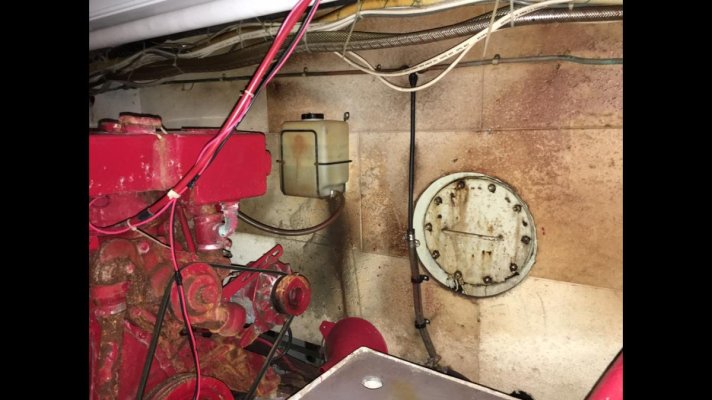Steve91T
Guru
- Joined
- Sep 12, 2016
- Messages
- 898
- Location
- USA
- Vessel Name
- Abeona
- Vessel Make
- Marine Trader 47’ Sundeck
Hey guys, I’m starting a new thread on this subject. We are under contract with a 47’ 1987 Marine Trader Sundeck. Some of you remember the previous posts where the boat was a floating condo for several years and the engine room has been neglected. The very slow mechanic in the keys is finally making progress.
So now that we are getting closer to the point of getting a survey, I wanted your advice.
The fuel tanks have 3 yr old diesel in them. On Tuesday they are going to be pumped out and replaced with fresh diesel. Also the fuel guy is going to put in an additive that will help clean whatever junk is growing in the tanks.
Without getting into too much detail again, the tanks hold 300 gallons a side. Nobody wants to open the inspection ports due to their age. We all know someday these tanks will start leaking, who knows when that might be. As of right now they aren’t leaking.
Here’s what I’m thinking. I make them top the tanks off. This will put as much pressure on them as possible. They will be test running the boat before the survey to make sure it’s ready to go, then there will obviously be the sea trial itself. If they hold up and we end up buying the boat, we then will run the tanks down to 1/4 full and keep the minimum amount of fuel in there for our needs. My thinking is that the less pressure on the old tanks, the better. This might lengthen their shelf life. Can’t hurt, that’s for sure.
My other thoughts are if we fill them up, we might be stressing the tanks and might cause problems down the road regardless. Maybe we shouldn’t have them topped off.
I know that if and when they do start to leak, I will be installing bladders or maybe small plastic tanks linked together. I will never need 600 gallons of fuel, not even close.
What would you guys do?
Have them filled?
Leave them less than 1/2
Let them run the boat with fresh fuel and see how often the filters clog?
Demand they find someone to open the inspection ports on the tanks? (Don’t think this is going to happen, and I know cleaning from the inside can actually expose weak welds cause leaks)
So now that we are getting closer to the point of getting a survey, I wanted your advice.
The fuel tanks have 3 yr old diesel in them. On Tuesday they are going to be pumped out and replaced with fresh diesel. Also the fuel guy is going to put in an additive that will help clean whatever junk is growing in the tanks.
Without getting into too much detail again, the tanks hold 300 gallons a side. Nobody wants to open the inspection ports due to their age. We all know someday these tanks will start leaking, who knows when that might be. As of right now they aren’t leaking.
Here’s what I’m thinking. I make them top the tanks off. This will put as much pressure on them as possible. They will be test running the boat before the survey to make sure it’s ready to go, then there will obviously be the sea trial itself. If they hold up and we end up buying the boat, we then will run the tanks down to 1/4 full and keep the minimum amount of fuel in there for our needs. My thinking is that the less pressure on the old tanks, the better. This might lengthen their shelf life. Can’t hurt, that’s for sure.
My other thoughts are if we fill them up, we might be stressing the tanks and might cause problems down the road regardless. Maybe we shouldn’t have them topped off.
I know that if and when they do start to leak, I will be installing bladders or maybe small plastic tanks linked together. I will never need 600 gallons of fuel, not even close.
What would you guys do?
Have them filled?
Leave them less than 1/2
Let them run the boat with fresh fuel and see how often the filters clog?
Demand they find someone to open the inspection ports on the tanks? (Don’t think this is going to happen, and I know cleaning from the inside can actually expose weak welds cause leaks)

